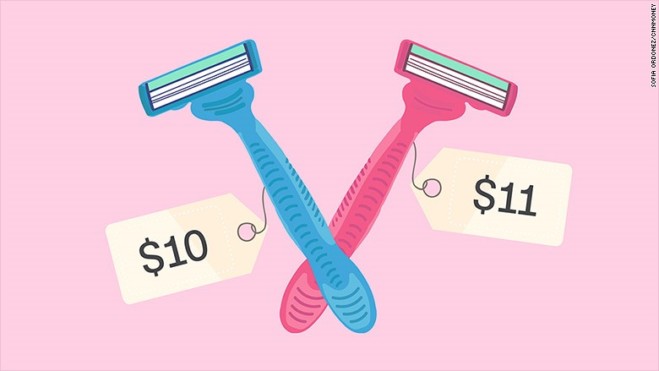Shqipe Budakova, a student at the University of Prishtina, sometimes buys non-specific gender products, or even male products. She thinks that the color pink or the decoration of packages with pink does not necessarily mean products are for women.
The main reason she does this is due to the different prices of products. Women`s products have a higher cost.
Erleta Terpeza, manager at a market in the municipality of Lipjan, has often faced complaints from customers because of different prices for equivalent products. This means that the same products, with almost the same shape and quantity, cost more for women compared to men.
“Sometimes we had complaints from the customers. Otherwise, some others choose a ‘neutral’ product, which means that it is produced for both genders,” she explains.
This phenomenon is globally known as pink-taxes.
Safet Gërxhaliu, head of the Kosova Chamber of Commerce, notes that it is important to measure this phenomenon from the psychological dimension as well, since it is a direct form of discrimination which makes women feel uncomfortable.
“Why should they always be hit in a financial way or why should their pocket be attacked only because they are women!? For this reason, I think that this phenomenon should be addressed more in Kosovo,” he says.
The manager Terpeza explains this gender- based discrimination. She says that even though products have the same brand, shape and contents, they differ in price.
“Even though this amount of money differs only in some cents or sometimes even euro, it can be considered discrimination. Products that have different prices are usually perfumes, deodorants, shampoos, handkerchiefs; elementary products for both genders but with a higher cost for women with the excuse that they have special smell or they differ in production,” she says.
As a concrete example, Terpeza mentions the shaving razor that has the same shape and size for both genders, but it only differs in color (pink and blue) — it costs 10 cent more for women.
The head of the Economic Chamber states that the market should be equal for all, and he thinks that there should be a more active approach in Kosovo and in region as well.
“I think that this is a phenomenon which is being put aside purposefully or not, or because lack of knowledge or lack of interest. But if not today, tomorrow we will have to solve this problem, since there cannot be a selective approach in the market,” Gërxhaliu says.
According to a study of New York City’s Department of Consumer Affairs, in general women pay 13% more than men for equivalent products.
If we add the fact that according to the Kosovo Agency of Statistics, the number of women who work is only 13%, the situation in our country is twice as worse.
When talking about Kosovo`s economic integrity, it is supposed to fulfill the European strategy “Small Business Act” of 2020 which has a priority to protect women`s rights in business.
Gërxhaliu asserts that the most negative effects of this kind of approach happen in societies that are in transition. These are characterized by a small number of women who work, and a lowering opportunity to generate individual tasks. The fact that there is a low level of female employment in Kosovo worsens this situation.
“I think it`s time for the Ministry of Finances to do something in this direction if there are offers to stimulate production and other economic processes. They should also start thinking about expense equality that attacks women,” Gërxhaliu says.
Fatbardha Terpeza








